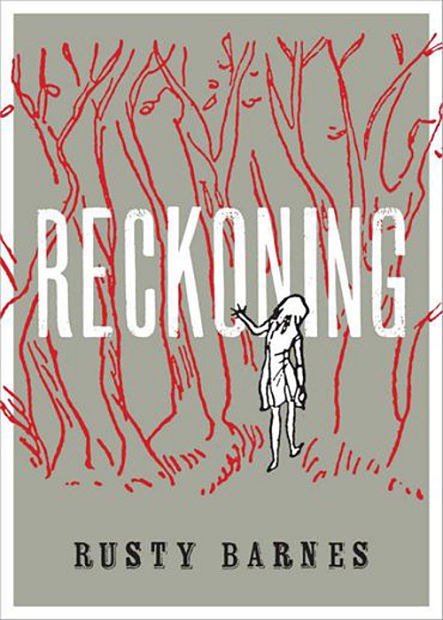Reckoning
Reckoning by Rusty Barnes is the story of a Richard Logan, a fourteen-year-old boy in a small Appalachian town. Richard and Katie, the pretty new girl in town, find an unconscious woman in a lake one day while swimming. This woman, Misty, along with Katie’s mother and Lyle, Richard’s adult nemesis, lead the way down a path into debauchery and violence in their wooded hamlet. In the description on the back of the book, it is called “brutal and beautiful” which is true in parts. The brutality is clearly used as a selling point, unsurprising when shows like Breaking Bad and True Detective are being celebrated for similar attributes, but I spent the first third of the book waiting for it. The discovery of the woman, Misty, in the water didn’t feel jarring or unsettling. Most of the commentary was about Richard’s sexual confusion and frustration when presented with a naked but unconscious woman while in the presence of his new crush. This felt realistic for a teenage boy, but the focus on it left me without a solid sense of the atmosphere of the discovery. Though, perhaps it was perfect by saying that all that a boy in the throes of puberty can think about is sex, no matter the circumstances.
There were many moments like this through the novel where I wanted to be engrossed in what was happening, but was drawn out of it by Richard’s inner monologue. This wasn’t always a bad thing because he is a wonderful and refreshing protagonist in many ways. It was particularly refreshing to see a teenage character, a kid in some respects, make mistakes and stupid decisions. There is nothing that irks me more than when a child is wise beyond their years. It can take away the sense of discovery, innocence, naiveté, and reduce them to a cliché rather than allowing them to have a believable personality which is infinitely more interesting. Barnes, in a series of wonderful moves, gave Richard failings. His priorities were occasionally skewed, he was foolhardy, reckless, stubborn, shy, and irresponsible. He felt real.
What I hoped for was a better sense of place and time in the novel. The Appalachian town was such an important part of the story but I never quite felt grounded there. Barnes takes us through what feels like the entire town a number of times but it’s mostly through a series of descriptions of characters walking or running from place to place. So many roads and paths were mentioned that I almost wanted a map so that I could keep things straight. What I wished for was a way to place myself in the town using something other than logistics. It’s such a great place for a novel to take place, and Barnes clearly feels close to his own Appalachian roots, but it felt like I was missing out on something by having to scramble to keep track of where the characters were running to rather than being able to sink in.
I also wanted Richard to have more to say or to have more at stake with his own family and place in the community. He has opinions on it which he voices a few times, like when speaking to Misty:
My uncle says Dad could have done something with himself, but he stuck around here for some reason.” When Misty mentions that he probably stayed there to have Richard, he retorts, “I could’ve been born anywhere. He could have left.
His mood seems to shift later on and it’s a bit hard to tell whether it’s newfound sentiment toward the town that has, by now, brought him pain and heartache, or just a moment of pride and superiority:
“He has no history, no right to be here. His kind are the ones who come in and buy all the land and put up their hunting camps they visit once a year and post it all the rest of the time so nobody else can hunt it.” Few people could claim history the way his family could. He felt justified today. There’d been someone of his blood in this country for two hundred years. If he felt like calling some Jerseyite transplant a flatlander he could.
Richard’s father and mother are hardly in the novel at all which made it difficult to get a solid grasp on their personalities. Aside from not feeling enveloped in the setting, my one other issue with the novel was that, aside from Richard, none of the other characters seemed wholly dimensional. Everyone was pretty much what you expected them to be. Lyle was the stereotypical pervy, backwoods villain. Misty was the addicted, woeful prostitute. Katie was the pretty, overtly sexual, devious crush who needed rescuing and a defender, and Richard’s parents were just parents. Each of them had potential and I felt left a little wanting, particularly because of how successful Richard was.
None of this is to say that I didn’t like Reckoning. I’ve already loaned my copy out, which I only do with books that I feel confident the other person will like. I just wished that it had completely delivered on what Barnes showed he was capable of giving.





